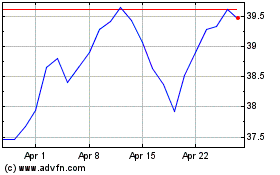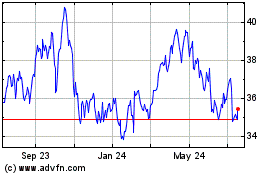BP: Renewables and Natural Gas to Dominate Energy Growth
February 15 2019 - 7:54AM
Dow Jones News
By Christopher Alessi
LONDON -- The vast majority of global energy supply growth is
expected to come from renewables and natural gas over the next two
decades, but steep investment in oil exploration and production
will be needed to meet crude demand in 2040, BP PLC said
Thursday.
In its annual energy outlook report, the British oil-and-gas
giant outlined as its central scenario a future in which renewable
energy sources -- including wind, solar, geothermal, biomass and
biofuels -- and natural gas will together account for 85% of the
world's energy growth in the run up to 2040.
As part of the scenario, renewable energy production is
projected to grow at a rate of 7.1% a year, with its share in
primary energy increasing to 15% by 2040, compared with just 4%
today. Natural gas would grow by 1.7% a year, surpassing coal as
the world's second largest source of global energy and rivaling oil
for the top spot by the end of the outlook period.
The new analysis "brings into sharp focus just how fast the
world's energy systems are changing, and how the dual challenge of
more energy with fewer emissions is framing the future," said BP
Chief Executive Bob Dudley.
BP's central forecast assumes that current government policies,
technology and societal preferences will continue evolving the way
they have in recent years.
The company underscored that its central forecast is one of six
possible scenarios, none of which it would endorse as most likely.
The other scenarios included the world requiring more energy to
support growth, a more rapid transition to lower carbon fuels,
mounting trade disputes that limit globalization, a ban on
single-use plastics and some oil-producing nations reforming their
economies at a faster pace.
"All of the scenarios suggest that oil will continue to play a
significant role in the global energy system in 2040," BP said in
the report, with the level of oil demand at the end of the period
ranging from 80 million barrels a day to 130 million barrels day.
That compares with the 99 million barrels projected for 2020.
As a result, the company said trillions of dollars of investment
in developing new oil fields will be needed to meet the world's
appetite for oil in 2040.
As part of the central scenario, BP continues to expect the
world's appetite for oil to peak around 2035, at close to 110
million barrels a day, before plateauing through 2040. Until 2018,
BP had predicted crude oil demand wouldn't stop growing until the
2040s.
BP's competitors are divided on when -- or whether -- they see
oil reaching a point of peak demand. Royal Dutch Shell PLC has said
that peak demand could come as soon as 2025, while U.S. oil majors
Chevron Corp. and Exxon Mobil Corp. don't foresee a peak.
Write to Christopher Alessi at christopher.alessi@wsj.com
(END) Dow Jones Newswires
February 15, 2019 07:39 ET (12:39 GMT)
Copyright (c) 2019 Dow Jones & Company, Inc.
BP (NYSE:BP)
Historical Stock Chart
From Mar 2024 to Apr 2024

BP (NYSE:BP)
Historical Stock Chart
From Apr 2023 to Apr 2024
